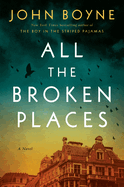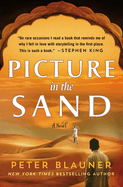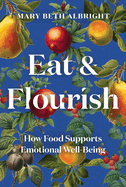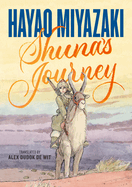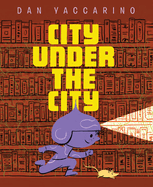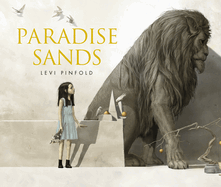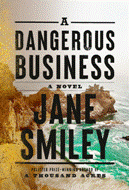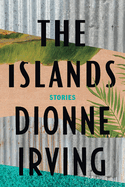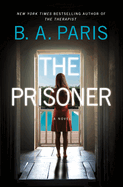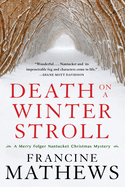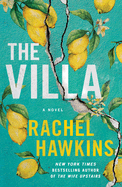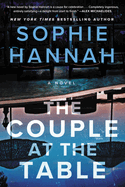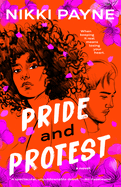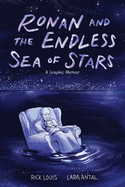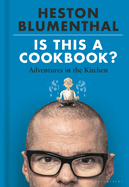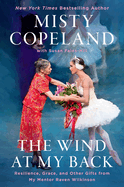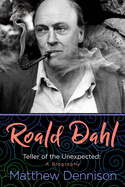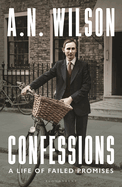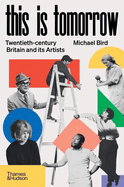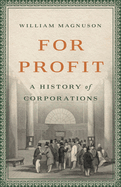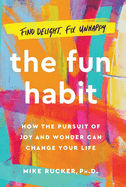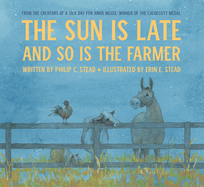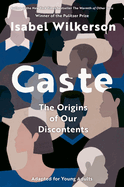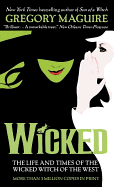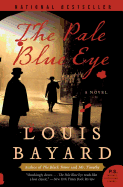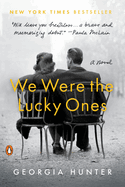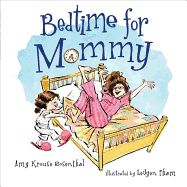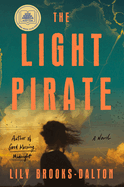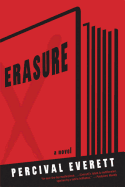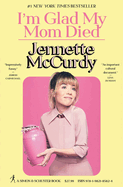Friday, January 6, 2023
This week, we review All the Broken Places by John Boyne, "a cunning domestic drama with breathtaking plot twists," a companion of sorts to his bestselling The Boy in the Striped Pajamas; Peter Blauner's "gripping" novel Picture in the Sand, which uses the filming of The Ten Commandments in Egypt during political upheaval as a springboard to explore the relationship between a grandfather and grandson; and We Deserve Monuments, Jas Hammonds's "mysterious and romantic" YA debut, in which a young woman discovers decades of concealed truths in her mother's hometown in Georgia. Plus so much more!
In The Writer's Life, Blauner discusses the seeds of his ninth novel, Picture in the Sand, and the resonance between Egypt's 1950s uprising and the present-day unrest in the region. --Jennifer M. Brown, senior editor, Shelf Awareness
All the Broken Places
by John Boyne
All the Broken Places by Irish novelist John Boyne is a cunning domestic drama with breathtaking plot twists, experienced through the eyes of a German woman desperate to escape an evil, shameful legacy: her father was one of Hitler's senior lieutenants, responsible for unimaginable atrocities during World War II. Gretel Fernsby, Boyne's enigmatic 92-year-old narrator, is a force to be reckoned with. A widow in impressive physical and cognitive health, she lives independently in a grand apartment overlooking London's Hyde Park. She keeps to herself, her self-imposed exile concealing her family's haunting, troubled wartime past that would destroy her and her son if revealed. Guilt and remorse over her father's war crimes, as well as her own silence, are her constant companions.
Boyne's plot alternates between Gretel's life in present-day London and the postwar years in Berlin, Poland and Paris. Readers of his work will have encountered a much younger Gretel in his sensational young adult novel, The Boy in the Striped Pajamas. In All the Broken Places, a standalone sequel, Boyne (The House of Special Purpose; The Absolutist) has crafted a diabolically complex protagonist made vulnerable by a lifetime of lies. Gretel--exquisitely tender with Henry, the young boy who lives downstairs--demonstrates merciless hostility to Henry's father, Alex, a Hollywood producer who physically abuses his wife and son and who taunts Gretel by digging into her past. As Alex's treatment of Henry worsens and he comes dangerously close to exposing Gretel's secrets, she is faced with two terrifying choices, neither offering any hope of redemption. --Shahina Piyarali, reviewer
Discover: A German nonagenarian living in contemporary London has spent a lifetime burying her family's shameful wartime past in this standalone sequel to The Boy in the Striped Pajamas.
A Dangerous Business
by Jane Smiley
She borrowed from King Lear for her Pulitzer Prize-winning A Thousand Acres, and in the chilling A Dangerous Business, Jane Smiley (Perestroika in Paris; Golden Age; Early Warning) invokes Edgar Allan Poe, specifically "The Murders in the Rue Morgue." It's the mid-1850s, and young Kalamazoo native Eliza Ripple is living alone in a Monterey, Calif., boarding house after her husband, Peter, was shot in a bar fight. Eliza starts working at a brothel run by Mrs. Parks, who warns that their line of work is "a dangerous business." Then again, she says, "being a woman is a dangerous business, and don't let anyone tell you otherwise." The gig turns out to be even more menacing than anticipated when some of the women disappear. With the help of her friend Jean MacPherson, who often dresses as a man and tends to women clients at a different brothel, and inspired by M. Dupin, the non-detective who solves the mystery in Poe's "The Murders in the Rue Morgue," Eliza tries to solve the disappearances.
Given the story's grisliness, Smiley's tone throughout is surprisingly breezy, and fans will welcome this entry into her body of work. She does a skillful job of keeping readers guessing with regard to the killer's identity and addressing themes as relevant today as they were then (the scourge of racism, the role of women in society). Upon reading Poe for the first time, Eliza discovers that she likes "the idea that a train of logic could lead to something utterly unexpected." Smiley takes readers on an equally unpredictable ride. --Michael Magras, freelance book reviewer
Discover: Two young women who work in brothels in 1850s California channel Edgar Allan Poe and investigate a series of murders.
The Islands
by Dionne Irving
Nine of the 10 stories in The Islands, the deeply satisfying first collection of short fiction from University of Notre Dame professor Dionne Irving (Quint), center women who share a Jamaican background. The plurality inherent in the title cleverly points to Jamaica but also England and, likewise, the insulated enclaves that diasporic communities create in faraway places.
Younger Black women reevaluate their interracial (power) relationships with older men in four stories: "All-Inclusive," about a model involved with a married white poet; "The Cape," in which a former student married to her professor struggles with his recovery after an (easily avoidable, ahem!) accident; "An American Idea of Fun," about an Ohio teen manipulated by the father of family friends who invite her for a summer in France; and "The Gifts," in which a Jamaican teen finds work as a nanny with a posh London family and leaves pregnant. Prickly mother-daughter relationships are exposed in "Some People," about a would-be screenwriter asked to participate in International Day at her daughter's school, and "Waking Life," about a travel journalist planning to meet her estranged mother. In "Canal," a Toronto woman returns to Panama to settle the affairs of a woman she had to call "abuelita" as a child. In "Weaving," the one story without a female protagonist, a boxer past his prime steals a piglet for his daughter--but arrives too late on her birthday.
Irving writes with an easy openness, her sentences seemingly straightforward, in stories with much that can be inferred between the lines: inequity, imbalance, erasure. She has a remarkable talent for understated, multilayered density that reveals stifling responsibilities, desperate dreams and fluttering hopes. --Terry Hong, Smithsonian BookDragon
Discover: Diasporic Black women populate nine of the 10 stories with Jamaican roots in this outstanding collection.
Mystery & Thriller
Picture in the Sand
by Peter Blauner
In 2014, Egyptian-American Alex Hassan leaves home, without giving his family many details, to join a jihadist uprising overseas. Trying desperately to get through to his grandson, Alex's grandfather, Ali Hassan, decides to share a long-held secret: his account of his experiences as a young man, working on the movie set of The Ten Commandments and getting swept up in political forces larger than himself. Picture in the Sand, the gripping ninth novel from Peter Blauner (Sunrise Highway; Proving Ground; Slow Motion Riot), traces the shifting relationship between grandfather and grandson as Ali recounts his adventures a half-century ago.
The brief, affectionate e-mails between Alex (who has renamed himself Abu Suror) and his grandfather provide an excellent framework for Blauner's main narrative, which begins as Cecil B. DeMille and his crew arrive in Egypt to film The Ten Commandments. Alex's reactions to Ali's experiences, and his perspective on his own situation, change dramatically throughout the novel, as Alex learns his grandfather's story (and experiences life with a jihadist group). Meanwhile, Ali's opinion of the visiting foreigners, as well as his other relationships--with his father, his cousin and the girl he loves--also change drastically as political events develop in Egypt. Blauner's narrative explores the complexities of life in Egypt at that time, taking readers from the prime minister's office to remote desert locations and glittering hotel bars. Part historical epic, part love story, part intergenerational family saga, Picture in the Sand asks important questions about home, ambition and what is truly worth fighting for. --Katie Noah Gibson, blogger at Cakes, Tea and Dreams
Discover: Peter Blauner's gripping ninth novel juxtaposes the filming of The Ten Commandments with a shifting grandfather-grandson relationship.
The Prisoner
by B.A. Paris
B.A. Paris (The Therapist; Behind Closed Doors), known for her dynamic psychological thrillers, uncovers the secrets behind the glamorous life of a billionaire, his family and the women he pulls into his web of lies in The Prisoner. Franco-British author Paris creates multidimensional characters of various cultural and socioeconomic backgrounds. Amelie Lamont has lost her father, who left her with seemingly nothing, and attempts to forge her own way. Nearly destitute, she is taken in by a stranger and creates her own family centered on female connections and friendships. Amelie's past and current lives, as depicted in alternating timelines, are both inspiring and terrifying. Soon after Amelie's best friend helps her secure a job at Exclusives magazine, Amelie finds herself marrying her billionaire boss in Las Vegas. Her new husband, Ned Hawthorpe, has his own motives for the marriage--but so does Amelie.
After both Amelie and Ned are blindfolded and dragged to an unknown location, Amelie must adjust to life in a dark room. The captors--and the motive behind the abduction--are unknown, but with so many skeletons in Ned's closet, Amelie uses her solitude to think of a few theories. Amelie, who starts to feel safer in the hands of her captor than her husband, tells the man, "if you release me at the same time as him... he'll kill me!" A twisted story of love, loss and lies, The Prisoner leaves readers wondering if anyone will make it out alive. --Clara Newton, freelance reviewer
Discover: B.A. Paris's The Prisoner exposes the darker side of human nature through a rags-to-riches story that is inspiring and terrifying.
Death on a Winter Stroll
by Francine Mathews
Death on a Winter Stroll, the seventh volume in the Merry Folger Nantucket Mystery series by Francine Mathews (Too Bad to Die), brings Christmas tidings and a murder or two to the small island of Nantucket. After several years of the Covid-19 pandemic, Nantucket is ready to bring back the popular Christmas Stroll and transform the island's Main Street into a winter wonderland. But the Stroll is not the only thing coming to Nantucket: a film production takes up residence on the island, with a large crew of A-list actors among the group; the secretary of state is visiting her vacation home; and a famous Instagram nature photographer is living--or possibly squatting--in a closed-up cabin. When the photographer winds up dead, soon followed by a member of the film crew, the recently promoted Chief Merry Folger is called to figure out what has happened in the usually serene beach destination she calls home.
Given the exceptionally large cast of characters in Mathews's ambitious mystery, it's no surprise that it takes time to get the lay of the land: who knew each other before they all arrived on the island, who denies knowing each other and whose secrets are relevant to the murders. Once these pieces come together, the novel proves a captivating whodunit, with plenty of clues and red herrings planted along the way for readers to untangle alongside Merry Folger. Death on a Winter Stroll, steeped in the "salt spray, damp sod, marsh" environment of Nantucket, is a seasonal cozy that will be best read by a fire with a warm beverage in hand. --Kerry McHugh, freelance writer
Discover: A cozy whodunit set in Nantucket invites readers to a holiday getaway in New England--with a side of murder.
The Villa
by Rachel Hawkins
Rachel Hawkins (Reckless Girls; The Wife Upstairs; Rebel Belle) brings two generations of artists to The Villa in a tense dual-timeline thriller set in Orvieto, Italy. In 1974, Mari; her married boyfriend, Pierce; and her stepsister, Lara, join a famous musician and his dealer for a summer of sex, drugs and rock 'n' roll. Pierce is brutally murdered at the villa that summer and, afterward, Mari publishes a tremendously popular horror novel and Lara releases one of the most acclaimed albums of the 1970s. Almost 50 years later, cozy mystery author Emily accepts an invitation from her lifelong best friend, Chess, to six weeks of relaxation and writing at the same picturesque villa. As Emily works to free herself from her long-running series and soon-to-be ex-husband, a nonfiction book about the murder fairly pours out of her. Chess is a much more successful writer of women's self-help books, however, and decades of resentment and competition resurface as trust and truth are tested.
Hawkins plays on gendered power dynamics and the complexities of sisterhood. As Mari writes: "Houses remember." And this Italian villa echoes with infidelity, secrets and toxic love--that of family, friends and lovers. Hawkins excels at foreshadowing, keeping readers just ahead of her true crime-writing heroine. Can Emily uncover and learn from the events of 1974? Or is she destined to repeat them? The Villa is a deliciously gothic mix of music, murder and messy relationships, perfect for readers who appreciate nuanced, morally gray characters and a bit of revenge. --Suzanne Krohn, librarian and freelance reviewer
Discover: Daisy Jones & The Six meets gothic suspense in Rachel Hawkins's The Villa, a dual-timeline thriller set in Orvieto, Italy.
The Couple at the Table
by Sophie Hannah
The lingering challenge in the engrossing The Couple at the Table by Sophie Hannah (Closed Casket; The Monogram Murders; The Other Woman's House) isn't who had a motive to fatally stab Jane Brinkwood at her father's couples-only Tevendon Estate Resort, but who did not have a reason to murder the vile, entitled woman. Frequently called "a nasty piece of work," Jane threatened every guest and staff member, accusing them of sending her menacing notes while she honeymooned. Jane was most disturbed by a note that told her to beware of the couple at the next table. But which table? Seating wasn't assigned and the tables mysteriously had been moved during the night. Jane saved most of her venom for guest Lucy Dean, whose ex-husband, William Gleave, left her for Jane two weeks after Lucy gave birth to their daughter. Lucy, despite maintaining that she is now happily engaged to the kind Pete Shabani, writes letters to the other guests, trying to ferret out Jane's killer. The case consumes curmudgeonly Detective Constable Simon Waterhouse and his socially aware wife, Sergeant Charlie Zailer, making another appearance in this 12th entry in the Zailer & Waterhouse Mystery series. The two detectives were vacationing at the British estate at the time of the murder and had a ringside seat to Jane's tantrums.
Hannah's expert plotting elevates The Couple at the Table, which works well as a locked-room mystery. Her dexterity with sly humor, mostly centered on Simon's personality (he really hates the resort's monogrammed towels), adds the perfect levity. An Agatha Christie-esque gathering of the suspects provides a tidy denouement. --Oline H. Cogdill, freelance reviewer
Discover: An ill-tempered woman's murder at an exclusive resort lacks no suspects in this captivating thriller.
Romance
Ship Wrecked
by Olivia Dade
Two fat actors are cast opposite each other in career-making roles after a one-night stand in Olivia Dade's Ship Wrecked, a body-affirming romance full of heat and heart. The day after Swedish stage actress Maria leaves Peter's hotel bed, they discover they're auditioning together for the biggest high fantasy drama on television: Gods of the Gates. They're soon committed to six years on a remote Irish island, portraying two Vikings shipwrecked alone together. Peter is determined to keep things professional while filming, although the two are still drawn to each other.
With snapshots taken during their years together on set, the author illustrates the characters' goodness, compatibility and crackling chemistry. Readers will eagerly anticipate the day shooting wraps and Maria and Peter will finally have a chance at romance, but the path to happily-ever-after is far from smooth. The press tour for the show will end soon and they have some big decisions to make. Can they overcome their fears and find a way to have both their careers and each other?
Olivia Dade's skill at crafting banter-filled romances with kind, cuddly, sexy characters will draw new readers, and those who've read Spoiler Alert or All the Feels will laugh at the novel's interstitial group chats and fanfic exchanges. Themes of home and chosen family make this high-heat romantic comedy a hopeful and comforting read. --Suzanne Krohn, librarian and freelance reviewer
Discover: Two actors finally act on six years of repressed feelings in this steamy romantic comedy for fans of Ali Hazelwood, Emily Henry and Mia Sosa.
Pride and Protest
by Nikki Payne
Cultural anthropologist Nikki Payne unapologetically attempts to subvert the canon in her first novel, Pride and Protest, a modern Pride and Prejudice retelling. The story--witty and freshly plotted with a vivid urban setting and some enjoyable takes on Jane Austen's classic characters--features a reluctant Filipino CEO and a fiery Black radio show host who continually butt heads over urban development.
Dorsey Fitzgerald's company, Pemberley, is proposing some drastic construction projects in Merrytown, a tightly knit Washington, D.C., neighborhood full of such housing projects as Longbourne Gardens, a place people have lived for years. Indignant over the potential gentrification of her beloved Merrytown, Liza B., a local DJ with a huge social media following, decides to use her platform to fight back against the Pemberley corporation. Liza reluctantly shares a Longbourne apartment with five other people--her cantankerous grandmother; her mother, who is eager to climb the social ladder; pageant-winning sister Janae; her brother Maurice, a member of the Nation of Islam; and her sister LeDeya, a makeup influencer. Anything Liza can do to help bring down local housing prices and allow some of them to move out would be a win. Liza, with her sharp tongue, and Dorsey, with his glamorous aesthetic, meet at a gala that Liza attends just to protest--and sparks fly.
Payne captures the subtle angst of Pride and Prejudice but does so with a modern, sexy vibe. Fans of Austen retellings, especially those who enjoyed Pride by Ibi Zoboi, are sure to like Pride and Protest. --Jessica Howard, freelance book reviewer
Discover: In this urban Pride and Prejudice retelling, a housing developer and a resident of a housing project find themselves reluctantly falling for each other.
Graphic Books
Shuna's Journey
by Hayao Miyazaki, transl. by Alex Dudok de Wit
In 1983, two years before Hayao Miyazaki cofounded the acclaimed Studio Ghibli, he published Shuna's Journey, a spectacularly illustrated graphic novel in watercolors about a young prince who undertakes an epic quest to save his citizens from looming starvation. Nearly 40 years after its Japanese debut, animation journalist Alex Dudok de Wit treats Anglophone audiences to a fluid translation. Shuna is heir to "a small kingdom which time had abandoned." Despite a tenacious gratitude on the part of the villagers, "sad and impoverished were their lives. Beautiful and brutal was the nature they lived in." An aging, dying stranger arrives, speaking "of a land, far off west, at the world's edge where the golden grain swayed in waves of fertility." Shuna, after the stranger's inevitable death, "[breaks] the law of the kingdom" and embarks on his journey--full of desolation and suffering--until hope (and humanity) arrive in a pair of young enslaved sisters. Shuna's altruistic determination never falters as he marches toward the unknowable.
Miyazaki's original 1983 afterword reveals that the story was inspired by a Tibetan folktale, "The Prince Who Turned into a Dog." He calls his initial dream of an animated adaptation of Shuna's Journey "unglamorous," which led to this "kind of visual adaptation." Translator de Wit expands Miyazaki's afterword, contextualizing the auteur's early work with the heroes and heroines who followed--and became internationally beloved. Perhaps now, given indisputable proof of Miyazaki's success, Shuna's Journey will head to the big screen. --Terry Hong, Smithsonian BookDragon
Discover: Gorgeously translated for English readers, this story, nearly 40 years old, from animation master Hayao Miyazaki tells of a prince desperate to save his starving people.
Ronan and the Endless Sea of Stars
by Rick Louis, illus. by Lara Antal
"I knew there was something I needed to understand, and perhaps share, about my brief, intense, joyful, devastating parenting experience," writes Rick Louis in the author's note to Ronan and the Endless Sea of Stars. Louis's heartbreaking experience of crushing loss is poignantly, lovingly illustrated by Lara Antal, who introduces Ronan, "a little-boy-shaped hole in the universe," as a dark shadow lit with glittering stars.
"I never thought I would be a parent," Louis admits. But then he married Emily and Ronan arrived. Ronan "seemed like a pretty happy baby." His indiscriminate word of choice was "Ung-ee"; he enjoyed baths; and his favorite book was Fishy Tails. But developmental delays led to doctors and a fatal diagnosis of Tay-Sachs disease. "But this is not a story about grief," Louis promises. "It is just the story of a little boy who was only here for a short while and what he was like and what he meant to us."
Louis explicitly acknowledges Antal for "capturing [his] somewhat quirky vision... perfectly." Indeed, Antal's empathy is evident. While deftly capturing difficult emotions, Antal also inserts unexpected humor: Louis's laptop sports a pear (not an apple); Antal translates the history of Tay-Sachs into a parody in which a Jew, Irishman and French Canadian walk into a bar, and a suited baby Ronan interrupts his parents' discussion by literally lifting the panel and overlaying his opinion with irreverent jokes: "Even a temp like me knows... life is short!" Louis and Antal prove to be symbiotically paired, affirming a beloved presence despite a tragic absence. --Terry Hong, BookDragon
Discover: A father lovingly immortalizes his late son in a graphic memoir filled with heartbreak but, perhaps surprisingly, no regrets.
Food & Wine
Eat & Flourish: How Food Supports Emotional Well-Being
by Mary Beth Albright
"Food is pleasurable," writes journalist Mary Beth Albright in Eat and Flourish, a brilliant exploration of the connection between food and emotional well-being. This sets the tone for what is to come: a health book that divorces wellness and nutrition from weight-loss goals and diet culture. Instead, Albright explores how what people eat contributes to how they feel--and the key role that pleasure takes in that connection. She grounds this "food-mood revolution" in extensive scientific research, providing a thorough overview of human digestion and the microbiome (the trillions of microbes found throughout the human digestive tract) as a starting point. From there, she brings in different elements of food and food culture: growing food, preparing and cooking it, eating it--and the many ways these interactions with nourishment create neural pathways in the brain that shape and support emotional health.
Eat and Flourish is a compelling and practical guide to how small changes in daily diets might make someone feel their best. Among the countless books extolling the virtues of "healthy" eating, this stands apart because of Albright's focus not just on nutrients but also on the "circle of food, nutrients, pleasure, and connection." Eat and Flourish presents a more intentional way of eating that supports every aspect of how a person feels--physically, mentally and emotionally. And in a world that's rife with chaos, the privilege of being intentional about what and why we eat is not one to be taken lightly. --Kerry McHugh, freelance writer
Discover: Journalist Mary Beth Albright offers a brilliant exploration of the connection between the food we eat and our emotional well-being.
Is This a Cookbook?: Adventures in the Kitchen
by Heston Blumenthal, illus. by Dave McKean
Heston Blumenthal (The Fat Duck Cookbook) takes readers on a singular culinary journey of the mind and body in Is This a Cookbook?: Adventures in the Kitchen. With three James Beard Awards and several books to his credit, the Michelin-starred chef clearly knows his way around food. But in Is This a Cookbook? he shares more of his life philosophy, in which the mechanics of cooking are only one part of a larger, fulfilling experience.
Is this a cookbook? Yes, but in Blumenthal's world, a cookbook is more than just lists of ingredients and recipe steps to follow. Is This a Cookbook? presents 70 eclectic but approachable recipes, with commentary and cooking notes. But in these 368 pages, it's clear that his goal isn't just to teach readers to cook some Tomato and Coffee Muffins. Instead, this cookbook reads almost like a graphic novel, complete with Dave McKean's somewhat trippy art. Blumenthal's loosely structured advice doesn't follow the standard cookbook order--appetizers, salads, entrees, desserts. Some chapters can be more easily categorized around food, such as a chapter on simple sandwiches ("The Mindful Sandwich"). But others are more about overall wellness, such as "The Fermentation Station: Ready to get to grips with the gut-brain and the brain-gut?"
Is This a Cookbook? is not just a reference book. It's a book to sit with, read cover to cover and then revisit for whenever inspiration is needed--or a reminder to slow down and fully experience life. --Suzanne Krohn, librarian and freelance reviewer
Discover: Heston Blumenthal invites readers to slow down and rethink their approach to creative, soul-nourishing cooking and eating in this offbeat and thoroughly engaging mostly-cookbook.
Biography & Memoir
The Wind at My Back: Resilience, Grace, and Other Gifts from My Mentor, Raven Wilkinson
by Misty Copeland and Susan Fales-Hill
Ballerina and activist Misty Copeland (Black Ballerinas; Firebird; Life in Motion) pays tribute to her mentor, Raven Wilkinson, in her second memoir, The Wind at My Back, cowritten by Susan Fales-Hill. Copeland, the first Black female principal dancer at American Ballet Theatre, had always drawn inspiration from her Black predecessors in classical ballet. But meeting Wilkinson in 2011 proved transformative for Copeland: here was a mentor who could truly understand her struggles as one of few Black women in the upper echelons of the ballet world. Copeland weaves her own story with Wilkinson's, sharing the latter's journey as the first Black dancer with the Ballet Russe de Monte Carlo, including stories of horrific discrimination she experienced while on tour in the American South. Wilkinson later joined the Dutch National Ballet and performed with the New York City Opera as a dancer and actor. Copeland champions Wilkinson's artistry and strength, praising her grace and warmth in the face of racism and other challenges.
Readers familiar with Copeland's work will appreciate the inside story of her historic performance in The Firebird, followed abruptly by a debilitating shin injury. Copeland shares her battle with impostor syndrome, her triumphs and anxieties around dancing Odette/Odile in Swan Lake and her deep gratitude for Wilkinson's steady encouragement through the seven years they knew each other. The epilogue calls out the enduring racism in the ballet world and elsewhere, reminding readers of the work still to be done. Thoughtful, vivid and warm, The Wind at My Back is a heartfelt tribute to a great artist and friend. --Katie Noah Gibson, blogger at Cakes, Tea and Dreams
Discover: Ballerina Misty Copeland pays tribute to her mentor, Raven Wilkinson, sharing some of Raven's (and her own) stories as a Black woman in classical ballet.
Roald Dahl: Teller of the Unexpected
by Matthew Dennison
Roald Dahl (1916-1990) had many flaws: he was irascible, self-aggrandizing, a feather-ruffler given to anti-Semitic remarks and a domineering husband who cheated on his first wife, American movie star Patricia Neal. Nevertheless, he was by all accounts a devoted father. Dahlophilic readers will take heart from this revelation in Roald Dahl: Teller of the Unexpected, an uncommonly perceptive biography of the children's book colossus by Matthew Dennison (The Queen; Behind the Mask; Queen Victoria).
Dahl was born in Llandaff, Wales, to Norwegian immigrant parents, his father a successful shipbroker who died when his son was three. In 1939, with war threatening and while working an under-stimulating office job in London, Dahl trained as a fighter pilot for the Royal Air Force. The following year, he survived a plane crash that was likely attributable to his inexperience. While working for the British Embassy in Washington, D.C., Dahl authored an account of his crash for the Saturday Evening Post and, in doing so, discovered his flair for writing.
Dennison--the author of books about two other children's literature greats, Beatrix Potter and Kenneth Grahame--is a resolutely objective chronicler, noting when something Dahl said doesn't jibe with the factual or emotional truth. Although it's directed at adults, Roald Dahl seems governed by a bedrock principle of writing for children: it doesn't overstay its welcome. Dahl fans, though they shouldn't expect an exhaustive look at Dahl's work, will savor tidbits like the fact that as a young man, the eventual author of Charlie and the Chocolate Factory saved the silver wrappers from his chocolate bars. --Nell Beram, author and freelance writer
Discover: Matthew Dennison, a resolutely objective chronicler, has written an uncommonly perceptive biography of children's book colossus Roald Dahl.
Confessions: A Life of Failed Promises
by A.N. Wilson
Biographer and journalist A.N. Wilson (The Mystery of Charles Dickens) pens a proper memoir of family, failed marriages and promises left unfulfilled in Confessions. He reflects on episodes from childhood to "early manhood" and writes that he is "inevitably made aware of failure, both as a writer and as a human being" in his roles as husband, parent, son and friend. Having witnessed the "forty-year psychodrama" of his parents' inexplicably long-lasting marriage, he was surrounded by male-female discord early on: "marital warfare was the air I learned to breathe." This bad lesson in marital bliss subtly foreshadows Wilson's own disastrous 15-year first marriage to an Oxford scholar 10 years his senior when he was only 20: "she had stolen my youth." Throughout his retrospective, a veritable who's who of Britain's literary world, Wilson struggles to understand the young A.N. who was "so thrustingly ambitious, so full of himself, so unfaithful, not only to his wife but to his own better nature."
Confessions does not hold back regarding Wilson's narrow escape and early brush with sexual abuse at a boarding school, as well his own "quite contradictory opinions" regarding his on-again-off-again relationship with Christianity. Written in a loquacious, charming style, Wilson shamelessly name-drops for negligible effect. (Non-British readers might struggle to make connections outside of Christopher Tolkien, Princess Margaret and a few others.) A must-read for devotees of Wilson's prolific literary output, Confessions is a rambling, poetry-infused remembrance of promises made, broken and reshaped along the way. --Peggy Kurkowski, book reviewer and copywriter in Denver
Discover: This memoir by prominent British novelist and historian A.N. Wilson captures the curious wonder of an older man seeking to understand the young one on his wild rise to literary repute.
History
This Is Tomorrow: Twentieth-Century Britain and Its Artists
by Michael Bird
For Michael Bird (Artists' Letters: Leonardo da Vinci to David Hockney), art is inextricable from its social and political context, and 20th-century Britain had a lot of that: multiple wars, austerity and a smorgasbord of clashing intellectual and philosophical beliefs. Bird's authoritative survey, This Is Tomorrow: Twentieth-Century Britain and Its Artists, is thoroughly and engagingly preoccupied with the "nature of art's potential contribution to the cause of social progress." It's safe to say it's a view of art that wasn't shared by all of 20th-century Britain--or all of 20th century anywhere.
This Is Tomorrow actually begins in 1878 with the libel trial that ensued in London after the critic John Ruskin accused the American expatriate painter James Abbott McNeill Whistler of making art that amounted to "flinging a pot of paint in the public's face." Tension of this sort, between the old guard and the newcomer flaunting fresh ideas, was a mainstay in the 100 years of art-making that followed--and, of course, it continues today.
Some British and Britain-based artists rise, cream-like, to the top in Bird's telling; among the best known (at least to American readers) are Whistler, Charles Rennie Mackintosh, Henry Moore, Lucian Freud, David Hockney, Yoko Ono and Damien Hirst, figurehead of the notoriety-courting Young British Artists, who capped off the century. This Is Tomorrow's black-and-white photos, approximately 60 of them, and its 18 color plates prove that while 20th-century Britain may have been a destabilized time and place, it had much to be proud of. --Nell Beram, author and freelance writer
Discover: In his authoritative and engaging survey, Michael Bird profiles 20th-century British and Britain-based artists whose output reflected their destabilized time and place.
Business & Economics
For Profit: A History of Corporations
by William Magnuson
In For Profit: A History of Corporations, law professor William Magnuson (Blockchain Democracy) delivers a comprehensive and lively account of eight corporations that have changed the world. His engaging, episodic history reveals the fundamental characteristics, extraordinary accomplishments and profound weaknesses of some of the world's most powerful institutions, including the Roman Republic, which forged publicly active, privately held institutions to win the Punic Wars; the Medici Bank, which financed Europe and an explosion of culture in medieval Italy; the transcontinental railroad (and the corporations to which Congress entrusted it) that connected the United States after the Civil War; and Facebook, the website that promises to connect everyone.
Magnuson, beginning in antiquity, constructs a compelling definition of the corporation. Although, as commonly understood, corporations are privately held instruments of wealth acquisition, they also live and die based on their ability to solve problems. These problems often exist beyond the capacity of existing institutions and private individuals, and solving them is critical to a society's flourishing--or even survival. But Magnuson is no apologist, nor does he gloss over corporations' structural challenges and their inherent risks of corruption. Particularly as the accounts approach contemporary times, Magnuson picks apart conventional defenses, and the blind worship of, the so-called virtues of such multinational and private equity corporations as Exxon, Kohlberg Kravis Roberts & Co. (KKR) and Facebook/Meta (and the transformations brought about by Silicon Valley as a whole). The result is a valuable, discerning assessment of these enormously influential societal actors--and a clear set of recommendations to make them serve the good. --Walker Minot, freelance writer and editor
Discover: William Magnuson paints an insightful portrait across time of corporations' functions, accomplishments and failures.
Psychology & Self-Help
The Fun Habit: How the Pursuit of Joy and Wonder Can Change Your Life
by Mike Rucker
Climbing the ladder toward happiness may, in truth, be scaling the wrong wall. That's the persuasive case Mike Rucker makes in The Fun Habit, a lively and engaging argument for escaping the "happiness trap" by trading the pursuit of an elusive mental state for the effort to inject more fun into your everyday life.
If there's an overriding theme to Rucker's book, it's that there's a strong element of intentionality in the quest for more fun. In aid of that effort, for example, he recommends creating a "Fun File" of activities in the upper two quadrants of something he calls the PLAY Model (just one of the book's several helpful acronyms)--things that are easy to execute and enjoyable ("Pleasing") and those that are more challenging ("Living"). And rather than detracting from enjoyable pursuits, he points out that it's critical to schedule time for fun, "looking carefully at the choices you're making about how to spend your time and considering whether they are in alignment with what supports your well-being, now and in the future."
The Fun Habit blends abundant but concise accounts of contemporary scientific research, stories drawn from Rucker's life and a profusion of practical tips on how to consciously bring more joy into our "critically fun-starved" lives. "Happiness is a state of mind," he writes, "but fun is something you can do." Though he holds a Ph.D. and is a charter member of the International Positive Psychology Association, Rucker writes in a conversational style that makes The Fun Habit feel more like advice over a coffee from a well-informed, thoughtful friend than a dry academic treatise. --Harvey Freedenberg, freelance reviewer
Discover: Psychologist and fun lover Mike Rucker has written an enjoyable treatise on the art of bringing more play and joy to life.
Humor
The World Deserves My Children
by Natasha Leggero
Comedian Natasha Leggero brings her brand of incisive, satirical stand-up comedy to a traditionally sit-down activity in her first book, The World Deserves My Children. Readers who know Leggero from her sitcom Another Period or The Honeymoon Stand-up Special on Netflix will find the same commentary on gender and class, pop culture and politics--but with a new focus: parenthood. Leggero, tongue firmly in cheek, starts off with her decision to become a parent: "Do what I did: face the most monumental decision you'll ever make and say, 'Hey, fuck it, why not?'" Following a difficult process that included rounds of in vitro fertilization and a miscarriage, Leggero was 42 and pregnant when she realized she'd opened herself up to a whole new world of worries. In addition to shifts in her career, freedom and body, now she'd be parenting through several simultaneous apocalypses, including the Covid-19 pandemic and near-constant California wildfires.
Leggero is self-deprecating, poking at everything from her skill at microwaving meals to her love of fashion, and she's able to make readers laugh even as she takes aim at patriarchy and consumerism. She exquisitely balances the essays: jokes about modern parenting and the entertainment industry sit alongside stories about the grounding joy of Jewish traditions and a heartwarming conversation with her husband and podcast cohost, Moshe Kasher. The World Deserves My Children is a very funny book about knowing that the world is ending and deciding to create someone amazing anyway. --Suzanne Krohn, librarian and freelance reviewer
Discover: Comedian Natasha Leggero's first book, about raising a child at the end of the world, is a balance of laughs and worries--just like parenting.
Children's & Young Adult
We Deserve Monuments
by Jas Hammonds
Jas Hammonds joins the literary world with We Deserve Monuments, a mysterious and romantic YA novel featuring a young Black-presenting biracial woman unsure whether to share the decades of concealed truths she uncovers in her mother's hometown.
Seventeen-year-old Avery imagines getting away to the beach or "an unfamiliar metropolis." Instead, her mother, Zora, announces they will be leaving Washington, D.C., and relocating to Bardell, Ga., to care for Mama Letty, the terminally ill grandmother Avery barely knows. Avery starts to form friendships with her fascinating next-door neighbor, Simone Cole, and the daughter of Bardell's most prominent family, Jade Oliver--whose mother's murder remains unsolved. As Simone and Avery's friendship blooms into romance, Avery wonders why Zora and Mama Letty's relationship is so unstable. While Mama Letty's health continues to decline, Avery, is haunted by Bardell's racist history--the town of only 9,127 harbors many secrets, and Avery's family is not unaffected.
Hammonds's debut is an outstanding, emotional novel that uncovers decades of familial secrets in a racist Southern town. Family, love, prejudice, death, trauma, sexuality and identity are all examined with care and subtlety. Hammonds is thoughtful as they showcase many kinds of love stories, both romantic and familial, and their deliberate and steady plotting connects the lives of the three generations of women. When their truths are finally revealed, the abundance of heart-wrenching revelations will surely leave engrossed readers catching their breath. --Natasha Harris, freelance reviewer
Discover: A teen new to a small Southern town must decide whether it's worthwhile to uncover decades of secrets or leave them buried in this outstanding, emotional debut novel.
City Under the City
by Dan Yaccarino
It's time to add another title to the list of excellent "portal" picture books. The (incomplete) list includes Maurice Sendak's In the Night Kitchen, Christian Robinson's Another and now Dan Yaccarino's City Under the City, a playfully dystopian story with a message.
Bix lives with her family in a city of the future above which hover the Eyes, which resemble yellow balloons, each with a single googly eyeball. The Big Brother-like Eyes "help" citizens, as by choosing what Bix and her classmates read on their screens at school. One day Bix's desire to elude the Eyes compels her to follow a rat under the ground, which leads her to an unpopulated "city under the city." (It resembles a city of the present.) There Bix discovers a disused room full of "strange-looking objects"--books. When she finally returns to her family, she brings a book, rousing the ire of the Eyes. Bix must resort to hero mode in order to rescue her sister from the Eyes and wake up her fellow citizens to what they've been missing.
This is heady stuff made enticing to young readers through cartoonish art with comics-style panels and a well-chosen palette: lavender-colored Bix and the yellow Eyes are, fittingly, color wheel opposites, and the red of the belowground city suggests vitality. In City Under the City, Yaccarino does again what he did so well in Doug Unplugged and Doug Unplugs on the Farm: comment on the present through the experience of a child of the future. --Nell Beram, freelance writer and YA author
Discover: In this playfully dystopian comics-style picture book, a girl takes on the Big Brother-like Eyes that "help" kids by choosing what they read on their screens at school.
Paradise Sands: A Story of Enchantment
by Levi Pinfold
A girl passes three days imprisoned in a disquieting, fantastical fortress to protect her brothers in Levi Pinfold's picture book Paradise Sands, a visually gripping, cyclical tale of sacrifice and determination.
This epic journey begins with a poem that frames a puzzling but prophetic path for the story. In several wordless sepia pages that follow, an unnamed protagonist and her three brothers set out in a sedan across a barren landscape to fetch their mother. The girl's idea to bring their mother flowers elicits a singing callback to the poem, suggesting the family's intimate familiarity with the verse. The group stops to gather white blooms but the brothers follow a dirt track to "a silent building" where they "drink deeply from the spring" despite the poem's clear admonitions not to. The brothers are spurred by empty stomachs to go deeper into the foreboding stone "HOTEL" and--having partaken of its food and drink--are trapped. After the girl declines the temptations, she faces the Teller, an enormous lion, who strikes a bargain: "Three days without eating or drinking and things will be as they were before you came here."
Pragmatic text sits in somber contrast to Pinfold's lushly detailed and unsettling mixed-media artwork. The meticulous nature of the art lures the reader's eye to the tiniest illustrative details, and cool blue endpapers stand in stark contrast to the leathery dryness of the sepia palette dominating this stunning and heavily symbolic story. Occasional bursts of color are startling amid the bleak stone backgrounds. Pinfold (The Song from Somewhere Else) blends underworld mythology with fairy-tale sensibility to haunting effect. --Kit Ballenger, youth librarian, Help Your Shelf
Discover: A girl bears the burden of her family's temptation in an ominous picture book with otherworldly themes and stunningly detailed sepia illustrations.
The Sun Is Late and So Is the Farmer
by Philip C. Stead, illus. by Erin E. Stead
Kid lit has picked up another memorable animal trio with The Sun Is Late and So Is the Farmer, which adds to the tally of disarming and dear picture books by frequent collaborators Philip C. Stead and Erin E. Stead (A Sick Day for Amos McGee; Music for Mister Moon).
One quiet night, three barnyard friends--a mule, a milk cow and a miniature horse--are feeling anxious: "The sun is late," says Mule. "And so is the farmer," says Milk Cow. They decide to consult a wise authority: "Barn Owl will know what to do." Barn Owl agrees with their assessment and tells them to "travel beyond the field full of sheep.../ past the sleeping giant,/ all the way to the edge of the world." There, Barn Owl assures the trio, they will find the sun. Mule, Milk Cow and Miniature Horse screw up their courage--they've never left the farm before--and follow Barn Owl's instructions.
Caldecott Medalist Erin E. Stead, here working in watercolors, graphite and colored pencils, introduces luminosity to her scenes by slathering nighttime blues with moon- and starlight, their subdued brightness reflecting on the ground in enchanting yellow flickers. Young readers of The Sun Is Late and So Is the Farmer will relish being miles ahead of the not-exactly-intrepid animal trio, not to mention Barn Owl, whose imperiousness is undercut by the bird's amusingly convoluted thinking. One illustration demonstrating this has Barn Owl imagining the outsize socked feet of the "sleeping giant"; as the animal friends are passing by, readers will note that the giant is actually a hulking piece of farm equipment. --Nell Beram, freelance writer and YA author
Discover: Readers of this disarming and dear picture book will relish being miles ahead of the trio at its center: barnyard animals who are convinced that the sun is worrisomely overdue for its entrance.
Caste: The Origins of Our Discontents (Adapted for Young Adults)
by Isabel Wilkerson
Pulitzer Prize-winning author Isabel Wilkerson tells her young adult audience that "caste is the wordless usher in a darkened theater, flashlight cast down in the aisles, guiding us to our assigned seats for a performance." But Wilkerson adroitly illuminates the whole auditorium by turning three intense spotlights on "the chilling... officially vanquished caste system of Nazi Germany," "the lingering, millennia-long caste system of India" and "the unspoken, race-based" system in the United States. This in-depth exploration pulls ugly secrets out of the shadows and gives name and shape to the "caste pyramid." Wilkerson's adaptation of her bestselling adult book brings this weighty subject to an accessible level for teen readers.
While this edition has been designed for young readers, adults who may have been hesitant to tackle the 500+ pages of the original should also find this version approachable and engrossing, as the adaptation provides a level of accessibility without compromising content. Wilkerson undoubtedly respects her YA readers and provides them a level of authenticity and honesty that reflects this esteem. She explains, "It turns out that everyone benefits when society meets the needs of the disadvantaged," then outlines how they can be a part of the solution: "in a world without caste, we would all be invested in the well-being of others... and recognize that we are in need of one another more than we have been led to believe." --Jen Forbus, freelancer
Discover: Pulitzer Prize-winning author Isabel Wilkerson's groundbreaking work is enlighteningly and accessibly adapted for young adult readers.
In the Media
The Writer's Life
Peter Blauner: Faith, Hope, Terror, Family and the Movies
 |
|
| (photo: Michael Parmalee) | |
Peter Blauner is the author of nine novels, including Slow Motion Riot, winner of an Edgar Allan Poe Award for best first novel from the Mystery Writers of America, and the bestselling The Intruder. He began his career as a journalist for New York magazine in the 1980s and segued into writing fiction in the 1990s. He has been a staff writer for several television shows, including Law & Order: SVU and Blue Bloods. He lives in Brooklyn, N.Y., with his wife, author Peg Tyre. Shelf Awareness spoke with Blauner about Picture in the Sand (Minotaur, $27.99, reviewed in this issue), a novel about the filming of The Ten Commandments on location in 1950s Egypt in the midst of national turmoil.
Tell us about the inspiration for Picture in the Sand.
I started writing this book in the spring of 2002, when everyone I knew in New York was still reeling from the Twin Towers attacks. Part of the Passover/Easter holiday tradition used to be the showing of Cecil B. DeMille's film The Ten Commandments on network TV. On that particular night, everyone had a hard time settling down for the holiday meal, so I found myself watching from the beginning. The credits rolled--Charlton Heston, Yul Brynner, Yvonne DeCarlo--and then it said the pharaoh's army was played by the Cavalry Corps of the Egyptian Armed Forces.
That was the moment when everything came together for me. I knew the movie came out in 1956 and must have taken two years to shoot. I also knew that Egypt in 1954 was ground zero for modern-day terrorism, with the military fighting the Muslim Brotherhood for control of the country. That meant the most extravagant Hollywood production in movie history was shot in the midst of that turmoil. I figured it would be a cinch to bang this book out in no time. Then I spent 20 years working on it.
As a young man, Ali Hassan is fascinated by the glamour of Hollywood, and dreams of living in America. How do his dreams differ from the eventual reality he encounters?
Ali Hassan gets a job working as Cecil B. DeMille's assistant and he thinks he's going to get the American Dream. He's going to follow the great man back to the States, he's going to change his name to Al Harrison, he's going to get a nice house in Pasadena, drive a Plymouth, marry the woman he loves, get a swimming pool and... well, it doesn't quite work out that way. Suffice to say that he goes through a lot. And some of it is brutal and heartbreaking. But I don't think he winds up disillusioned at all. He doesn't become a big Hollywood mogul. And he goes through some pain and family sorrow, like we all do. But in the end, Ali achieves a more realistic version of the American Dream, a little frayed and battered, but something he can feel at peace with when he closes his eyes.
Ali decides to share his life story with his grandson, Alex, hoping it will help him to make better (or simply different) decisions. How does Ali's action demonstrate the power of sharing our stories?
Without giving the whole plot away, hearing the story of the unlikely friendship Ali formed with a former enemy, from another faith, in 1954 has a direct effect on the way Alex, his grandson, treats a so-called enemy combatant from that same faith in our era. As a direct result of hearing that story, the grandson makes the decision that ultimately diverts him from the dangerous path he was on and directs him toward a very different future.
I don't think centuries of ethnic hatred turn to love overnight. I do know that I've sometimes changed my mind about individuals after hearing their whole story. That lunatic teacher you had in fifth grade is a more sympathetic figure when you find out he was a prisoner of war. If a book changes the way you look at the world--even just a little bit--then it was worth the time you spent reading it.
Alex's perspective on his grandfather's adventures changes dramatically as he reads Ali's story. Can you talk about the shifts in his point of view?
Alex, the grandson, begins the book in a state of disgust with America and with the modern world in general. Like a lot of angry men, he's bought into the myth of a heroic past when things were somehow more noble. He wants to be a holy warrior. And he wants to find himself a wife. He thinks no one in his family will ever understand him. But his grandfather Ali knows better. He's not only seen this movie before; he's lived it. But he's kept it a secret from his family until now.
So part of the story within the story is the grandfather gradually revealing that secret and the grandson growing up enough to understand it. I think part of the reason it took me so long to write the book is that I needed to get some perspective of my own. It's an historical novel, but I wanted to make sure it has something to say to people today.
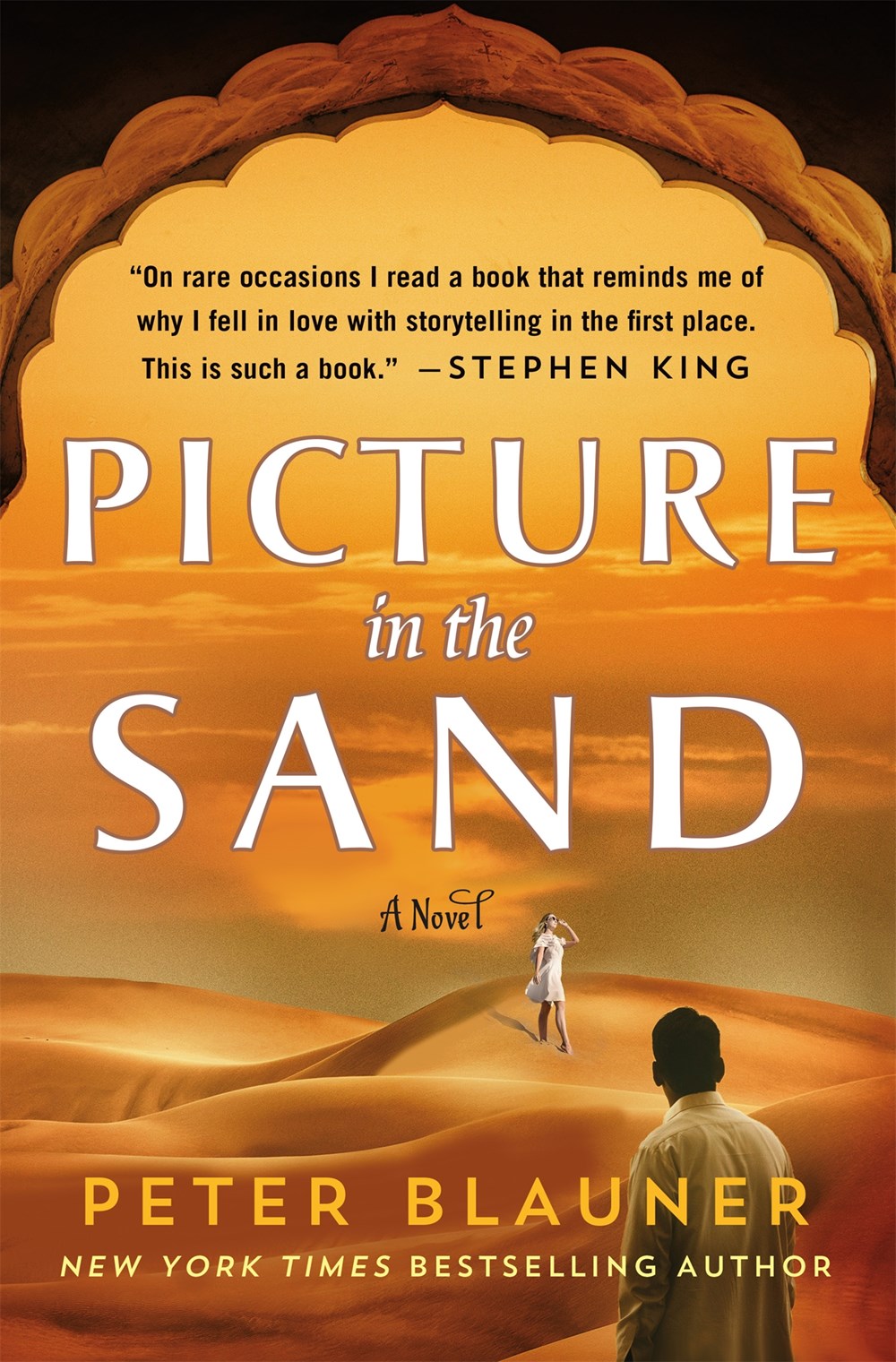 The novel explores the tensions between certain Eastern and Western ideologies in the 1950s and the present day. How do you think this tension is still relevant today?
The novel explores the tensions between certain Eastern and Western ideologies in the 1950s and the present day. How do you think this tension is still relevant today?
I think that distorted looking glass goes both ways. In America, we have a lot of stereotypical ideas about people in the Middle East. The scholar Edward Said called it "Orientalism." But there's also "Occidentalism": people in the Middle East stereotyping Westerners. I saw that in the six times I went to Egypt, researching the novel. I heard a lot of hopes and ambitions from young people that almost any American would identify with. But I also heard some broad statements about Western licentiousness and materialism that didn't always ring true.
The irony is that this novel takes place in 1954, at a moment when those two cultures seemed to be coming together. Egypt had just cast off centuries of oppression and outside interference to become an independent republic. America had an obsession with the Middle East that could have moved beyond exoticism. A sub-theme in the novel is why that romance fell apart.
The novel is set against a backdrop of turbulent Egyptian politics. How does this background inform the modern-day storyline where Alex joins a jihadist group?
Some of the exact same things are happening today. The tension between West and East, between religious extremism and the attraction to pop culture, between faith and hopelessness. Ali and his grandson both feel those tensions within themselves. They both have this conflicted relationship with popular culture and America.
For Ali, the grandfather, it's about classic Hollywood and realizing that's never going to be his world. For Alex, it's about video games and questioning what kind of future he has in the West. They both flirt with religious extremism and violence. They both grapple with a sense of destiny, trying to decide if everything is preordained or a matter of human will. At the end of the day, both the grandfather and the grandson are a couple of down-to-earth guys from Brooklyn (and the Middle East) looking for love in all the wrong places. --Katie Noah Gibson
Book Candy
Book Candy
The Oxford University Press blog shared "nine literary New Year's resolutions."
"Works by Hitchcock and Arthur Conan Doyle... are now part of the public domain," Mental Floss noted. Also Virginia Woolf and Franz Kafka, among others.
Open Culture highlighted Isaac Asimov on "how libraries can radically change your life (1971)."
Bookshelf featured the Library at Elsinore, a bookcase installation by British artist Tom Phillips, who died in November.
Great Reads
Rediscover: Edith Pearlman
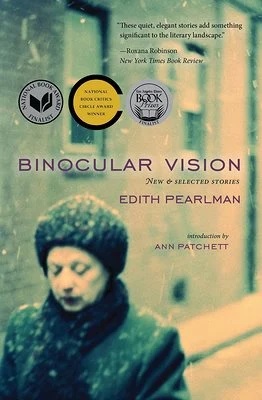 Edith Pearlman, whose acclaimed 2011 collection of short stories, Binocular Vision, "lifted her out of relative publishing obscurity to make her an instant if belated literary star at the age of 74," died January 1 at age 86, the New York Times reported. In 2011, Ben George, an editor with Tin House magazine, was starting a new press, Lookout Books. Impressed with Pearlman's earlier books of short stories--Vaquita (1996), Love Among the Greats (2002) and How to Fall (2005)--he asked her if he could publish a collection of her selected and new stories to inaugurate Lookout Books. Binocular Vision was subsequently nominated for a National Book Award, National Book Critics Circle Award and the PEN Malamud Award for excellence in the short story.
Edith Pearlman, whose acclaimed 2011 collection of short stories, Binocular Vision, "lifted her out of relative publishing obscurity to make her an instant if belated literary star at the age of 74," died January 1 at age 86, the New York Times reported. In 2011, Ben George, an editor with Tin House magazine, was starting a new press, Lookout Books. Impressed with Pearlman's earlier books of short stories--Vaquita (1996), Love Among the Greats (2002) and How to Fall (2005)--he asked her if he could publish a collection of her selected and new stories to inaugurate Lookout Books. Binocular Vision was subsequently nominated for a National Book Award, National Book Critics Circle Award and the PEN Malamud Award for excellence in the short story.
In her introduction to Binocular Vision, Ann Patchett, who had selected one of Pearlman's pieces for the 2006 Best American Short Stories anthology, compared the writer with short story masters John Updike, Anton Chekhov and Alice Munro. In her rave review of Binocular Vision on the front page of the New York Times Book Review, novelist Roxana Robinson asked: "Why in the world had I never heard of Edith Pearlman? Pearlman's prose is smooth and poetic, and her world seems safe and engaging. So it's arresting when, suddenly, almost imperceptibly, she slips emotion into the narrative, coloring it unexpectedly with deep or delicate hues."
Pearlman wrote another collection, Honeydew, also edited by George. It was published in 2014, when she was 78, by Little, Brown, her first book with a major publisher, and it earned her a second National Book Award nomination. It would also be her final book. "Edith has always known that death is the essential human story," Patchett told the New York Times in a profile of Pearlman in 2015. "It's not about falling in love. It's not about travel and expectation. The difference between her and the rest of us is that she has always had this electricity, this capacity to draw beauty from loss."


